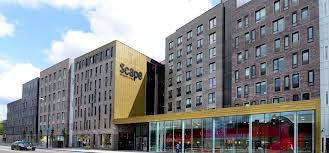News
- Home
- GCP Student Living results underline resilience of accomodation market

GCP Student Living results underline resilience of accomodation market – GCP Student Living (DIGS) showcased the resilience of the student accommodation as it reported results for the H1 period to December 31, 2018. The mostly-London focused company filled its 10 ten properties (around 3,600 beds), hitting an occupancy rate of 97% (full occupancy by its definition) as international students continued to flock to the UK, aided by the relatively weak pound, while EU students’ acceptance rates at universities were above pre-2016 levels.
DIGS has provided shareholders with an annualised total return of 11.9% since its IPO in 2013, reflecting its own success in providing competitive private housing as well as the wider popularity of London’s Universities. Student housing has held up particularly well compared to other subsets of the property market since the referendum vote in 2016.
Over the past year, DIGS says that it has generated a share price total return of 14.7%, compared to 6.7% for the FTSE EPRA/NAREIT UK benchmark. DIGS has reportedly outperformed over several years. It ahs provided the following highligts from the results:
The board says that, since the EU referendum in 2016, it has repeatedly noted that the future risks of Brexit remain unknown and difficult to quantify. At the time of writing, there remains considerable uncertainty as to the possible outcomes for Brexit. Notwithstanding, the attraction of the UK, and London in particular, for domestic and global students alike remains evident in the board’s view. The UK has some of the highest-ranking universities in the world, with three in the top ten institutions in 2017/18 (Times higher education world university rankings 2018). Education remains a core sector for the UK economy, generating £95 billion and supporting nearly one million jobs across the nation.
With the number of international students in the UK continuing to rise (a substantial number of whom choose to study in and around London) the board remains confident that the company will continue to deliver stable performance.
[QD comment: From the perspective of London-focused direct student letting businesses like DIGS, London Mayor Sadiq Khan’s proposed ‘London Plan’ would impact them in some of the following ways: 1.) stifle growth of new developments in London by reducing returns for developers, 2.) increase the incentives to grow supply of student housing outside London, and 3.) be good for existing direct-led properties in London (lower supply growth environment), which would not be affected by the proposals and therefore likely to generate higher returns.
The Mayor’s proposals aim to making lodging more affordable for domestic students. Developers of student accommodation would be required to enter into pre-planning agreements with universities, offer a percentage of affordable rooms in their buildings and potentially face a ‘clawback’ levy by the government if they have been deemed to have profited excessively from a building.]
DIGS: GCP Student Living results underline resilience of accomodation market